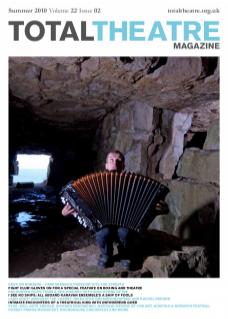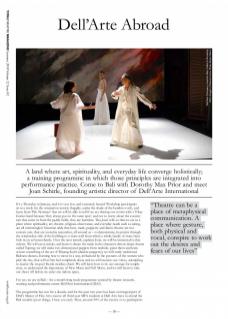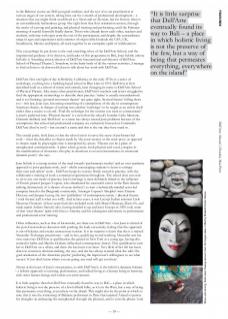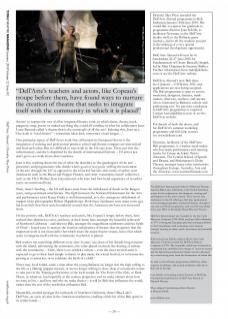It’s a Thursday in January, and it is very hot, and extremely humid. Workshop participants sit in a circle for the orientation session (happily, under the shade of the bamboo roof), and learn from ‘Pak Newman’ that we will be able to tell if we are sharing our rooms with a Tokay Gecko lizard because ‘they always poo in the same spot’, and not to worry about the country rats that come in from the paddy fields, they are harmless. ‘Ibu Joan’ tells us that we are in a place where spirituality, art, theatre, religious observance, and everyday needs such as eating, are all intermingled. Newman adds that here, mask, puppetry and dance-theatre are not esoteric arts, they are everyday necessities, all around us – to demonstrate, he points through the windowless side of the building to a stone wall from which a whole family of stone faces look in on us benevolently. Over the next month, explains Joan, we will be immersed in that culture. We will carve masks, and learn to dance the mask in the character-driven dance-drama called Topeng; we will make two-dimensional puppets from rawhide, paint them and learn at least something of the art of Wayang Kulit (shadow puppetry); we will study traditional Balinese dances, learning how to move in a way, influenced by the postures of the women who pick the rice, that will at first feel completely alien; and we will exercise our voices, attempting to master the six-part Kecak monkey chant. We will learn how to tie our sarongs for temple wear, to understand the importance of New Moon and Full Moon, and we will learn to take our shoes off before we enter any indoor space.
For yes, we are in Bali – for a month-long study programme curated by theatre research, training and performance centre Dell’Arte International (DAI).
The programme has run for a decade, and for the past two years has been an integral part of DAI’s Master of Fine Arts course: all third-year MFA students at Dell Arte have to attend the Bali module (poor things, I hear you say?). Thus, around 50% of the twenty or so participants in the Balinese course are DAI postgrad students, and the rest of us are practitioners at various stages of our careers, taking time out for a month of professional development – a situation that you might think would lead to a ‘them and us’ division, but far from it; there is an extraordinarily harmonious group vibe right from that first orientation session, through the weeks of carving and painting, and physical training and performing, until the February morning of tearful farewells finally dawns. Those who already know each other, teachers and students, welcome with open arms the rest of the participants, and despite the extraordinary range in ages and experiences and countries of origin (which include the USA, UK, Scandinavia, Mexico and Spain), all work together in an exemplary spirit of collaboration.
This can perhaps be put down to the soul-enriching ethos of the Dell’Arte School, and the inspirational guidance of its director, and leader of this programme in Bali, Joan Schirle (whose full title is ‘founding artistic director of Dell’Arte International and director of Dell’Arte School of Physical Theatre’). Somehow, in the hurly burly of all the various activities, I manage to find an hour to sit down with Joan to talk about her work with Dell’Arte.
Dell’Arte first saw light of day in Berkeley, California, in the early 1970s as a series of workshops, evolving into a building-based school in Blue Lake in 1975. Dell’Arte at first described itself as a school of mime and comedy, later changing its name to Dell’Arte School of Physical Theatre. Like many other practitioners, Dell’Arte’s teachers and actors struggled to find the appropriate terminology to describe their practice: ‘mime’ is usually misunderstood and is too limiting; ‘gestural movement theatre’ not quite right; ‘devised theatre’ falling short too – this last, Joan says, becoming something of a catchphrase of the day in contemporary American theatre, in danger of turning into another ‘technique’ to be taught as an end in itself rather than a means to an end. ‘Find the technique for the content you want to communicate’ is Joan’s preferred take. ‘Physical theatre’ is a term that the school’s founder Carlo Mazzone-Clementi disliked; and ‘Dell’Arte’ as a name has always caused Joan problems because of the assumptions that school and professional company are exclusively focused on Commedia Dell’Arte (they’re not!) – but a name’s a name and this is the one they have stuck to.
The crucial point, feels Joan, is that the school exists to serve the cause of performer-led work – what she describes as theatre made by ‘the actor-creator or the actor-poet’, as opposed to theatre made by playwrights that is interpreted by actors. ‘Theatre can be a place of metaphysical communication. A place where gesture, both physical and vocal, conspire in the manifestation of characters who play in situations to reveal circumstances in emotional dynamic poetry’ she says.
Joan Schirle is a strong resister of the tend towards ‘performance studies’ and an over-academic approach to post-graduate work, and – whilst encouraging students to learn to critique their own and others’ work – Dell’Arte keeps its courses firmly rooted in practice, with the collaborative making of work a continual requirement throughout. The school does not exist to serve any one mode of practice, but its heritage is most definitely linked to the influence of French pioneer Jacques Copeau, who abandoned his successful career in the Paris theatre (talking dismissively of ‘a theatre of scene-shifters’) to start a holistically-minded actor-led company based in the Burgundy countryside. Amongst Copeau’s ‘disciples’ were Étienne Decroux and Jacques Lecoq, the two ‘godfathers’ of contemporary mime / physical theatre / total theatre (call it what you will!). And in later years, it was Lecoq’s Italian assistant Carlo Mazzone-Clementi (whose career had also included work with Marcel Marceau, Dario Fo, and mask-maker Amleto Sartori) who, having decided to up and leave Europe in 1959, took some of that ‘total theatre’ spirit with him to America and his subsequent adventures in performance and professional actor training.
Other influences, such as that of Grotowski, are there too in Dell’Arte – but Joan is critical of the post-Grotowskian obsession with pushing the body excessively, feeling that this approach is out-of-balance and creates unnecessary tension. It is no surprise to learn that she is a trained Alexander Technique practitioner – and in fact, qualifying in and teaching Alexander was her own route into Dell’Arte (a qualification she gained in New York at a young age, having also trained in ballet and Martha Graham influenced contemporary dance). This qualification took her to Dell’Arte on a whim, and there she has been ever since. Very little of her life has been down to conscious decision-making, she says, and she has always resisted what she calls ‘the goal orientation of the American psyche’, preferring the improviser’s willingness to see what occurs: ‘if you don’t know where you are going, any road will get you there’.
Always at the heart of Joan’s own practice, as with Dell’Arte’s, is the belief in dynamic balance – a holistic approach to training, performance, and indeed living as a human being in harmony with other human beings and within our environment.
It is little surprise then that Dell’Arte eventually found its way to Bali – a place in which holistic living is not the preserve of a few leftfield folks, as it is in the West, but a way of being that permeates everything, everywhere on the island. This might also be the point at which to note that it was the witnessing of Balinese performers in Paris that inspired Artaud to pursue his thoughts on embracing the metaphysical through the physical, and to coin the phrase ‘total theatre’ to express the sort of all-in integrated theatre work, in which dance, drama, mask, puppetry, song, poetry or indeed anything else, could all combine in what his collaborator Jean-Louis Barrault called ‘a theatre that is the crossroads of all the arts’. Echoing this, Joan says, ‘Our work is “total theatre” – sometimes ideas lead, sometimes visual images…’
One particular aspect of Dell’Arte’s work that still retains its European flavour is the integration of training and professional practice: school and theatre company are intertwined and feed each other. But it is difficult to tour work in the US, says Joan. There just isn’t the infrastructure, and she is dispirited by the dearth of international festivals – US artists just don’t get to see work from other countries.
Joan is also scathing about the rise of what she describes as ‘the gatekeepers of the arts’ – presenters and programmers who decide what’s good or not good, ‘stifling the movement of the arts through the US’ as opposed to the artist-led festivals and events of earlier years (luminaries such as the Bread and Puppet Theater, and other ‘community-based’ collectives, such as the UK’s Welfare State International, who Joan had first-hand experience of in earlier years, are mentioned here).
Then, there’s funding – the US still bears scars from the withdrawal of funds in the Reagan years, and government interference. The fight between the National Endowment for the Arts and performance artist Karen Finley is well documented, as is the outrageous withdrawal of support from photographer Robert Mapplethorpe. Both these incidences were many years ago, but Joan feels that these were boundaries crossed that the American arts have not recovered from.
On the positive side, Dell’Arte’s teachers and actors, like Copeau’s troupe before them, have realised that alternatives exist, and have, at their home base amongst the beautiful redwoods of Northern California – and when in Bali, amongst the magnificent rainforests and rice fields of Ubud – found ways to nurture the creation and practice of theatre that recognises that the important work is not necessarily that which tours the major theatre venues, but is that which seeks to integrate itself with the community in which it is placed.
‘Bali teaches me something different every time I come,’ says Joan of her decade-long romance with the island, referencing the ceremonies, the value placed on ritual, the sharing of culture with the community… ‘Here, there is no celebrity culture – even the most revered artist is expected to go to their local temple to dance or play music for a local festival, or to honour the passing at a cremation, or to celebrate the birth of a child.’
There may, God forbid, come a time when the young Balinese no longer feel the high calling to the life as a Dalang (puppet master), or are no longer willing to close shop at a moment’s notice to take part in the Topeng performance at the local temple for The Feast of the Fish, or Dark Moon, or whatever, but hopefully as the century progresses and we make choices about how we want to live – and how and why we make theatre – it will be Bali that influences the world, rather than the rest of the world that influences Bali.
Meanwhile, nestled amongst the redwoods of Northern California, there’s Blue Lake’s Dell’Arte, an oasis of calm in the American maelstrom, cradling a little bit of the Bali spirit in its tender hands…
Dell Arte Abroad will next be in Amsterdam 22-27 June 2010 for Fundamentals of Clown: Basically Stupid, led by Matt Chapman & Suzanne Bakker. Further information from matt@dellarte. com or see the Dell’Arte website.
Dell’Arte Abroad’s next Bali dates are 6 January – 4 February 2011, and applications are now being accepted. The Bali programme is open to actors, musicians, designers, dancers, maskmakers, directors, teachers, and anyone who is interested in Balinese culture and performing arts. No previous enrolment in Dell’Arte programmes is required. Contact louise@dellarte.com or see the Dell’Arte website.
For details of both the above, and for Dell’Arte’s summer workshop programme and full-time courses see www.dellarte.com
Newman, facilitator of the Dell’Arte Bali programme, is a leather mask-maker who has made performance and training masks for Cirque du Soleil, Teatro Zinzanni, The Central School of Speech and Drama, and Shakespeare’s Globe Theatre, amongst many other institutions throughout Europe, Australia, Asia and the Americas. www.commediamask.com
The Dell’Arte International School of Physical Theatre, based in Blue Lake, California, is the North American centre for the exploration, development, training and performance of the actor-creator. They are the only institution in the US offering a full-time professional actor training programme in physical theatre, through a one-year certificate programme, and a NAST-accredited three-year MFA in Ensemble-Based Physical Theatre.
Dell’Arte International was founded by the late Carlo Mazzone-Clementi (1920-2000) and Jane Hill in Berkeley in 1971 to bring the European physical training tradition to the United States and to develop actor-creators through training in mime, mask, movement and ensemble creation.
With actors Joan Schirle and Jon-Paul Cook, Carlo Mazzone-Clementi created the Dell’Arte Players Company in 1976. The ensemble, which has continued to the present day, embodies the concept of ‘actor as creator’ and the belief that professional theatre can be enhanced by a rural setting away from the distractions of urban life.
As well as the full-time programmes, Dell’Arte offers summer workshops, and annual residencies abroad, in Bali and in Europe.
Joan Schirle is founding artistic director of Dell’Arte International and director of Dell’ Arte School of Physical Theatre.
The company’s producing artistic director is Michael Fields.



